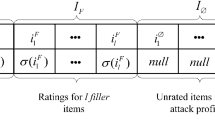Abstract
Despite its success, similarity-based collaborative filtering suffers from some limitations, such as scalability, sparsity and recommendation attack. Prior work has shown incorporating trust mechanism into traditional collaborative filtering recommender systems can improve these limitations. We argue that trust-based recommender systems are facing novel recommendation attack which is different from the profile injection attacks in traditional recommender system. To the best of our knowledge, there has not any prior study on recommendation attack in a trust-based recommender system. We analyze the attack problem, and find that “victim” nodes play a significant role in the attack. Furthermore, we propose a data provenance method to trace malicious users and identify the “victim” nodes as distrust users of recommender system. Feasibility study of the defend method is done with the dataset crawled from Epinions website.
Similar content being viewed by others
References
Schafer J B, Konstan J, Riedl J. Recommender systems in e-commerce. In Proc. the 1st ACM Conference on Electronic Commerce, New York, USA, Nov. 3–5, 1999, pp.158-166.
Sinha R, Swearingen K. Comparing recommendations made by online systems and friends. In Proc. the DELOS-NSF Workshop on Personalization and Recommender Systems in Digital Libraries, Dublin, Ireland, Jun. 18–20, 2001.
Massa P, Avesani P. Trust-aware collaborative filtering for recommender systems. In Proc. International Conference on Cooperative Information Systems, Agia Napa, Cyprus, Oct. 25–29, 2004, pp.492-508.
Massa P, Bhattacharjee B. Using trust in recommender systems: An experimental analysis. In Proc. the 2nd International Conference on Trust Management, Oxford, UK, Mar. 29-Apr. 1, 2004, pp.221-235.
Fuguo Z. Research on trust based collaborative filtering algorithm for user's multiple interests. Journal of Chinese Computer System, 2008, 29(8): 1415–1419.
Lam S, Reidl J. Shilling recommender systems for fun and profit. In Proc. the 13th International Conference on WWW, New York, USA, May 17–20, 2004, pp.393-402.
Milgram S. The small world problem. Psychology Today, 1967, 2: 60–67.
Gyöngyi Z, Garcia-Molina H, Pedersen J. Combating Web spam with TrustRank. In Proc. the 30th International Conference on Very Large Data Bases, Toronto, Canada, Aug. 31-Sept. 3, 2004, pp.576-587.
Krishnan V, Raj R. Web spam detection with anti-trust rank. In Proc. the Workshop on Adversarial Information Retrieval on the Web, Seattle, USA, Aug. 10, 2006.
Wu B, Goel V, Davison B D. Topical TrustRank: Using topicality to combat web spam. In Proc. the 15th Int. Conf. World Wide Web, Edinburgh, UK, May 23–26, 2006, pp.63-72.
Srivatsa M, Xiong L, Liu L. Trust guard: Countering vulnerabilities in reputation management for decentralized overlay networks. In Proc. the 14th Conf. World Wide Web (WWW 2005), Chiba, Japan, May 10–14, 2005, pp.422-431.
Levien R. Advogato trust metric [Ph.D. Dissertation]. UC Berkeley, USA, 2003.
Ziegler C N, Lausen G. Propagation models for trust and distrust in social networks. Information Systems Frontiers, 2005, 7(4/5): 337–358.
Jøsang A, Gray E, Kinateder M. Analysing topologies of transitive trust. In Proc. the Workshop of Formal Aspects of Security and Trust, Pisa, Italy, Sept. 8–9, 2003.
Victor P, Cornelis C, Cock M D et al. Gradual trust and distrust in recommender systems. Fuzzy Sets and Systems, 2009, 160(10): 1367–1382.
Abdul-Rahman A, Hailes S. A distributed trust model. In Proc. the 1997 Workshop on New Security Paradigms, Lang-dale, UK, Sept. 23–26, 1997, pp.48-60.
Chen R, Yeager W. Poblano: A distributed trust model for peer-to-peer networks. Technical Report, Sun Microsystems, Santa Clara, USA, Feb. 2003.
Aberer K, Despotovic Z. Managing trust in a peer-2-peer information system. In Proc. the 10th International Conference on Information and Knowledge Management, Atlanta, USA, Nov. 5–10, 2001, pp.310-317.
Golbeck J, Parsia B, Hendler J. Trust networks on the semantic web. In Proc. Cooperative Intelligent Agents, Helsinki, Finland, Aug. 27–29, 2003.
Guha R. Open rating systems. Technical Report, Stanford Knowledge Systems Laboratory, Stanford, USA, 2003.
Guha R, Kumar R, Raghavan P et al. Propagation of trust and distrust. In Proc. the 13th Annual International World Wide Web Conference, New York, USA, May 17–22, 2004, pp.403-412.
Page L, Brin S, Motwani R et al. The pagerank citation ranking: Bringing order to the web. Technical Report, Stanford Digital Library Technologies Project, 1998.
Woodrufifi A, Stonebraker M. Supporting fine-grained data lineage in a database visualization environment. In Proc. the 13th Conference on Data Engnieering (IEEE ICDE), Birminghm, UK, Apr. 7–11, 1997, pp.91-102.
Herlocker J L, Konstan J A, Riedl J. Explaining collaborative filtering recommendations. In Proc. CSCW 2000, Philadelphia, USA, Dec. 2–6, 2000, pp.241-250.
Author information
Authors and Affiliations
Corresponding author
Additional information
Supported by the Foundation of Jiangxi Provincial Department of Education under Grant No. GJJ. 10696.
Electronic supplementary material
Below is the link to the electronic supplementary material.
Rights and permissions
About this article
Cite this article
Zhang, FG. Preventing Recommendation Attack in Trust-Based Recommender Systems. J. Comput. Sci. Technol. 26, 823–828 (2011). https://doi.org/10.1007/s11390-011-0181-4
Received:
Revised:
Published:
Issue Date:
DOI: https://doi.org/10.1007/s11390-011-0181-4




